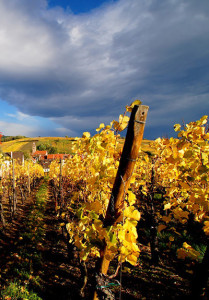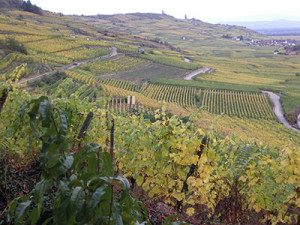Article by Alexander Eeckhout
The Alsace region is known as white wine country. Bordering Germany, its wines are similar to German whites. Most of the Alsatian wines are produced from Riesling, Gewurtztraminer, Pinot Blanc or Pinot Gris. They have fruity, herbal and mineral palates. The region is also known for its extensive and strict wine regulations. On top of those comes another one.
 Most people associate the region with dry whites. Yet there are many semi-sweet and sweet varieties produced as well. The last fifteen years even saw a surge in the production of sweeter whites. This made the Association of Alsace Producers decide that the region’s dry whites are obliged to carry the word “dry” on labels starting from the 2016 vintage. This move was made because they believe consumers are afraid of buying an off-dry or sweet wine when they want they want a dry one. Apparently the info on labels isn’t always clear endangering your dinner party in the process.
Most people associate the region with dry whites. Yet there are many semi-sweet and sweet varieties produced as well. The last fifteen years even saw a surge in the production of sweeter whites. This made the Association of Alsace Producers decide that the region’s dry whites are obliged to carry the word “dry” on labels starting from the 2016 vintage. This move was made because they believe consumers are afraid of buying an off-dry or sweet wine when they want they want a dry one. Apparently the info on labels isn’t always clear endangering your dinner party in the process.
The decision doesn’t sit well with a lot of producers. They claim that dry Alsace wines are the norm and off-dry or sweet wines the exception. They are also afraid that it commodifies and homogenises a business that is all about individuality and difference. It makes it too easy for the consumer and they’ll lose their capacity to make a choice, some producers claim. Other producers don’t mind this evolution and are in favour of clearer labeling.
It is indeed a bit of a dilemma. Should producers make the choice for consumers easier by clearly stating wether a wine is dry or not? Should we put all sorts of different wines with unique personalities in one category or should we be smarter oenologists? Connoisseurs might agree that labeling a wine as dry is too tight a label. Where does a wine go that is not dry but not off-dry either? Then again you don’t want a sweet wine when you want a dry one and we can’t all be sommeliers.
wether a wine is dry or not? Should we put all sorts of different wines with unique personalities in one category or should we be smarter oenologists? Connoisseurs might agree that labeling a wine as dry is too tight a label. Where does a wine go that is not dry but not off-dry either? Then again you don’t want a sweet wine when you want a dry one and we can’t all be sommeliers.
This is an interesting discussion not only for Alsace wines but for wine in general. Should producers categorise wines heavier or do wine lovers have to know their proverbial shit? We’ll leave the decision up to you.



 0
0